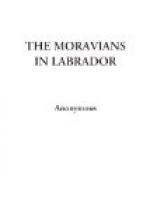the baptized Esquimaux learn his determination, than
they immediately went, took it down, and set it up
in the midst of their own dwellings, with such demonstrations
of welcome, that he exclaimed, he had never met with
any thing like it before; nor could he understand why
they should shew such disinterested love to him, a
stranger. In visiting the sick, the missionaries
had much satisfaction; there was now no horror at the
thought of death—no disposition to return
to their sorcerers; but calm, peaceful resignation
to the Divine will, or holy joy in the prospect of
soon seeing their Redeemer, face to face. Magdalene,
in the view of departure, said, “I weep not
over the pain I feel, though that is very great, but
for joy that my Saviour is near my heart. O would
but Jesus come and take me to himself! I long
to go to him, as a child longs for its parent, to
behold him, and to embrace his feet. I feel no
gloom; my heart is filled with joy in believing on
him.” Benigna, upon her recovery from a
dangerous illness, thus expressed herself: “I
think that it pleased the Lord to afflict so many in
our house with illness, and to restore them again,
that he might prove us, to know whether we could place
all our hopes in him, even in perplexity and pain;
and I have now found that he is able, not only to
bring us safe through the most distressing circumstances,
but to establish us more and more in full reliance
upon his help alone. During this illness, the
Lord has given me to feel his presence so sweetly,
that if it had been his will, I should have rejoiced
to go and be with him for ever; but since it has pleased
him to restore me to health, my heart is filled with
gratitude towards him.” Among the strangers,
the power of God was no less wonderfully displayed
in awakening them from the deep sleep of sin and death:
they came and confessed their sins and their crimes,
which, though formerly deemed light matters, now heavily
burdened their consciences. “Human nature
shudders and starts back,” says the missionary
diary, “on hearing the horrid detail of the
abominations practised among the heathen;” and
they themselves would often exclaim, “O! how
shocking the way in which we lived in sin; but we
were quite blind, and chained down by the fetters
of Satan; we will serve him no longer, but belong only
to Jesus.”
One instance deserves more particular notice, that of a young man named Angukualak, the son of a most noted sorcerer, Uiverunna. His parents had instructed him in all the secrets of their art, and his confession gives at least plausibility to the opinion, that the influence of Satan is permitted to be sometimes visibly exercised, in the dark places of the earth, though, while the effects of that influence are palpable in the perpetration of the grossest vices and most barbarous cruelty, it is very immaterial whether it assumes a perceptible form, or merely acts upon the imagination. His own account to the missionaries, was as follows:




